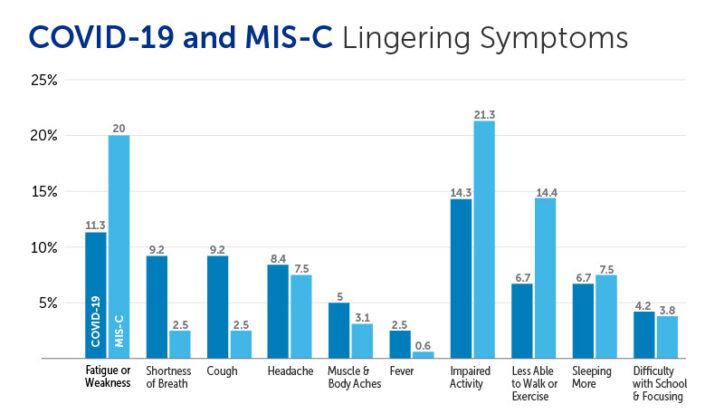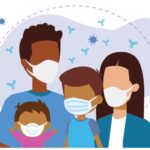Lingering health problems in children and youth after COVID-19 and MIS-C

More than one in four children and adolescents hospitalized with COVID-19 or multisystem inflammatory syndrome in children (MIS-C) had persisting health problems two to four months later, finds a study led by Boston Children’s Hospital, one of the largest of its kind to date.
Just published in the journal Pediatrics, the study tracked 358 patients under age 21 who were admitted to 25 U.S. children’s hospitals from May 2020 to May 2021 — before COVID-19 vaccines were available to this age group. Of these, roughly 40 percent were hospitalized with acute COVID-19 and roughly 60 percent with MIS-C. Many were admitted to the intensive care unit.
The researchers were able to survey family caregivers for 78 percent of the youth two to four months later. According to caregivers, 27 percent of those with acute COVID-19 and 30 percent of those with MIS-C had persistent symptoms, activity impairment, or both.
“Almost three quarters were back to their previous level of health, even those who were critically ill, which is reassuring,” says study leader Dr. Adrienne Randolph. “But unfortunately, more than one in four were not. Although this is much better than many reports in hospitalized older adults, it is still very worrisome. The risks of severe illness and of lingering complications are higher than the risk of complications from the vaccine, which are very rare.”
Lingering symptoms, activity impairments
The most common lingering symptoms were fatigue or weakness, affecting 11 percent of children and adolescents after COVID-19 and 20 percent after MIS-C. Next were shortness of breath and cough, each affecting 9.2 percent and 2.5 percent, respectively.

Less common were headaches, muscle and body aches, and fever. However, 21 percent of those with MIS-C and 14 percent of those with acute COVID-19 had activity impairments. For example, 14 percent and 7 percent, respectively, could not walk or exercise as much as before, and about 7 percent of both groups were sleeping much more than usual. Some had difficulty getting schoolwork done or felt distracted and unable to focus.
In the COVID-19 group, children and adolescents with more affected organs (such as the heart, lungs, and kidneys) were at highest risk for a prolonged recovery or activity impairment. Among those with MIS-C, the main risk factors were underlying respiratory conditions like asthma and being overweight.
Ongoing investigations
Dr. Randolph notes that this study was limited to children and adolescents who needed to be admitted to the hospital. It also took place early in the pandemic, mostly before the Delta surge.
“We’re in the process of analyzing more recent data covering the Delta period and part of the Omicron period,” she says. “I think it’s possible there will be differences. We want to understand how all the different variants affect children and track how effective vaccination is in preventing long-term complications.”
Investigations through the national, CDC-funded Overcoming COVID-19 study, launched by Dr. Randolph in 2020, are also looking at neurologic complications of COVID-19 and MIS-C with detailed cognitive testing.
“The bottom line is that now that vaccines are available, I strongly recommend that children and adolescents get vaccinated,” Dr. Randolph says. “We know that patients can be re-infected even if they’ve had COVID-19.”
According to data from the CDC, just 5 percent of children aged 6 months to 4 years had received at least one COVID-19 vaccine dose as of August 3, 2022. Only 30 percent of 5- to 11-year-olds and just 59 percent of 12- to 17-year-olds had received the full two-dose series.
“We’ve shown that vaccination can prevent severe disease in both 12- to 18-year-olds and 5- to 11-year-olds,” Dr. Randolph says. “So why take a chance?”
Learn more about COVID-19 research at Boston Children’s Hospital
Related Posts :
-

Pregnant mothers who get COVID-19 vaccines are also protecting their babies
Recent studies have shown that COVID-19 vaccination is safe for expectant mothers and can protect them against infection, severe illness, ...
-

Previous COVID-19 or MIS-C does not protect kids from Omicron
You would think that having had COVID-19 once, you’d have antibodies that would protect you against repeat infections. But ...
-

A new symptom of COVID-19 in young children: Croup
During the Omicron surge, pediatricians and emergency departments (EDs) began noticing something new: a surge in croup among infants and ...
-

Joining the fight against COVID: Women scientists at Boston Children’s are leading the way
When the COVID-19 pandemic hit in 2020, many women scientists around Boston Children’s pivoted to studying the new coronavirus and ...





